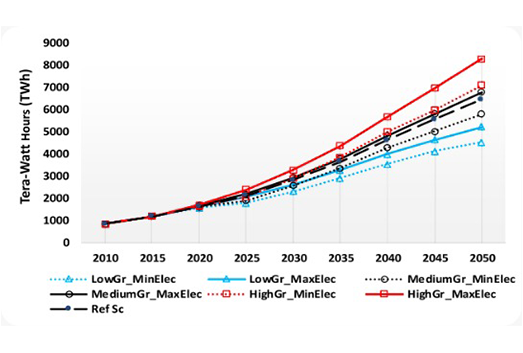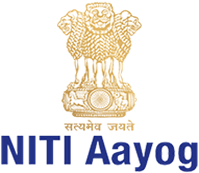
Modelling Studies
Study: A study shared by Dr Prasoon
Title : Climate Risk and Impact Assessment
Description : Learn about TERI's climate change research focusing on climate modeling, risk assessments across sectors, and solutions for building resilience. The presentation provides an overview of TERI's work on regional climate projections, extreme event analysis, sectoral impact studies, policy support, and more.
Study: A study by Dr Volker Krey
Title : IPCC scenarios, integrated assessment models and key concepts for integrating climate change research across research domains
Description : An overview of the evolution of IPCC scenarios, including the New Scenarios Process, the establishment of Representative Concentration Pathways (RCPs) and Shared Socioeconomic Pathways (SSPs), the introduction of CMIP6/ScenarioMIP, the integration of equity and fairness in scenarios, and the latest updates on SSPs.
ICEMF_webinar_2023-08-03_volkerkrey.pdf
Study:
Title : Challenges in the prediction of Extreme events in a Climate Change Scenarios
Description : This study provides an understanding of climate change with recent severe weather events for better preparedness, adaptation and mitigation
Modelling study_230323_IIT Bhubaneswar.pdf
Modelling study 1 :
Title : Modeling decarbonization pathways for India
Description : This study demonstrates Energy Policy Simulator to achieve India’s energy and net-zero goals.
Modelling study_290322_WRI India.pdf
Modelling study 2 :
Title : Harnessing India’s Renewable Edge for Cost-Effective Energy Independence: Sectoral Pathways*
Description : This study highlights India's unique opportunity to leapfrog to a clean energy infrastructure.
Modelling study_290322_LBNL Berkley.pdf
( * - Preliminary findings )
Modelling study 3 :
Title : Decarbonising India’s Power System: Technological options and costs
Description : This study assesses the technology and cost implications of Net Zero of the Indian power sector by 2050 & 2060.
Modelling study_290322_IRADe.pdf
Modelling study 4 :
Title : Decarbonization Policy Pathways for India
Description : This study focus on the question of how India achieve ‘deep decarbonization’ by 2050.
Modelling study_290322_Tufts University.pdf
This section includes modelling studies and papers published by the members of IEMF
Integrated Modelling Study of the Food-Energy-Water Nexus in India, 2018, TERI
This study aims to quantitatively study the water requirements of the Indian energy sector under different energy scenarios up till the horizon year 2051. Thre energy scenarios aim to capture different levels of ambition of GHG mitigation policies, as well as different growth rates for the country through 2051.[…]


Impact of Power Sector Growth on Water Resources, April 2018 by CSTEP
This study assesses the impact of power sector growth on water resources during the modelling horizon 2010-50. Power sector's water footprint using an energy-system model is analysed and a reference scenario is developed to account for the effects of the proposed power sector targets and water regulations on the future water demand.[…]
Report on "Energy, Food and Water Nexus - analysis in Macroeconomic consistency framework", Nov 2017 by IRADe
This study comprehensively assesses the nexus between energy, food and water and provides a policy based suggestion on the most optimal strategy for Energy sector growth and water conservation and water use efficiency. Scenarios on water requirement till 2050 under existing water use policies and trends are developed and the macroeconomic impacts are analysed. […]
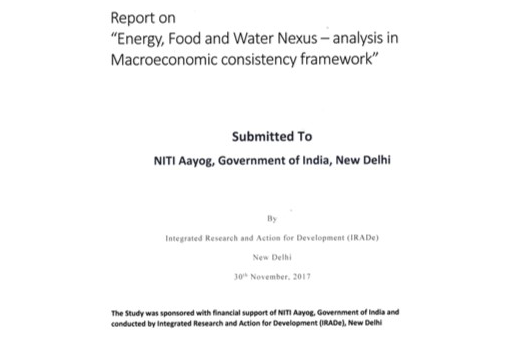

Data Gaps in India’s Energy Sector, December 2015, Prayas (Energy Group)
This study conducts a deeper investigation of public dissemination of energy sector data in lndia, compares it with what should ideally be available and contrasts with international best practices. Data gaps on the supply side and important sub-sectors on the demand side are analysed. [….]
Comparison of Decarbonisation Strategies for India’s Land Transport Sector: An Inter Model Assessment, April 2019 by TERI, CEEW, CSTEP, IRADe, PNNL
This report provides the results of an inter-model comparison exercise undertaken by five modelling teams to analyse the future growth of India’s transport sector and to evaluate the role of various transport sector policies in reducing transport related energy & emissions in India. […]
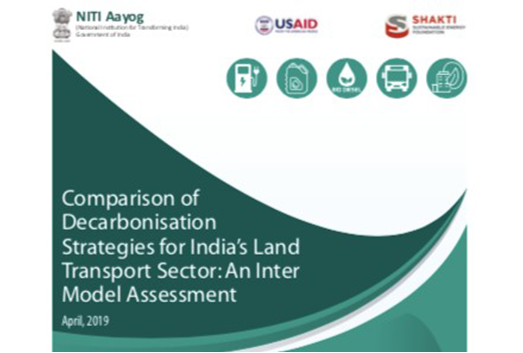
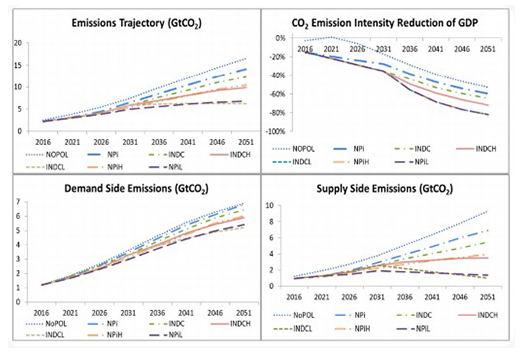
India’s energy sector choices—options and implications of ambitious mitigation efforts
This article examines the choices that might be needed for India’s energy sector under alternative mitigation scenarios. The article draws on the CD-LINKS study—a collaborative EU project under which seven pathways based on different combinations of carbon budget (high and low) and policy implementation (early and late) were developed and examined. This study uses the MARKAL energy system model to develop these scenarios. [..]
Pathways towards India’s nationally determined contribution and mid-century strategy
India’s emission mitigation policy, as reflected in its Nationally Determined Contribution (NDC), focuses on two energy sector related variables- share of non-fossil sources in the electricity generation sector, and emission intensity of India’s GDP. This paper undertakes a scenario-based uncertainty assessment to understand if there is room to enhance the mitigation ambition of India’s energy sector related NDC targets and inform long-term decarbonisation. [..]
